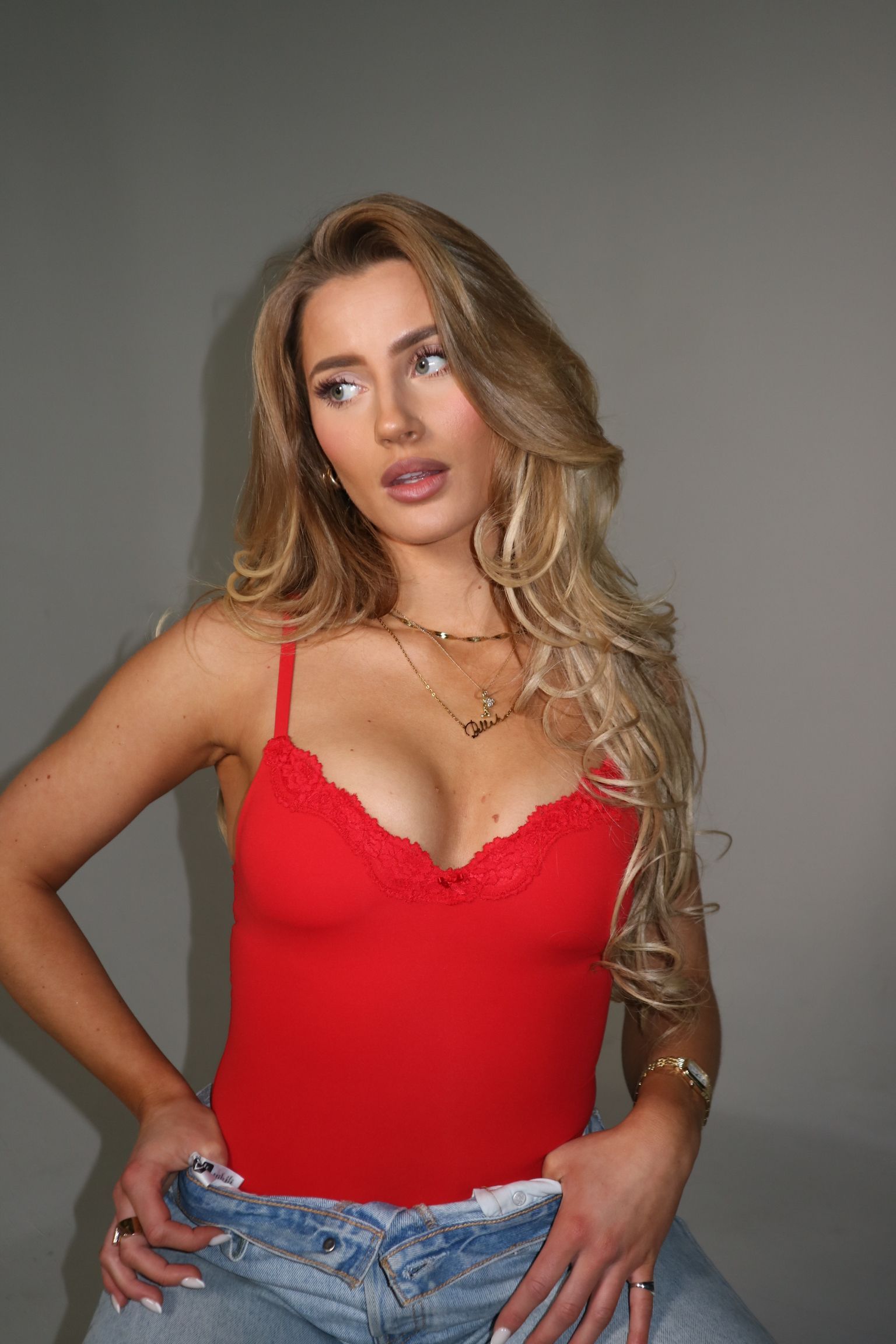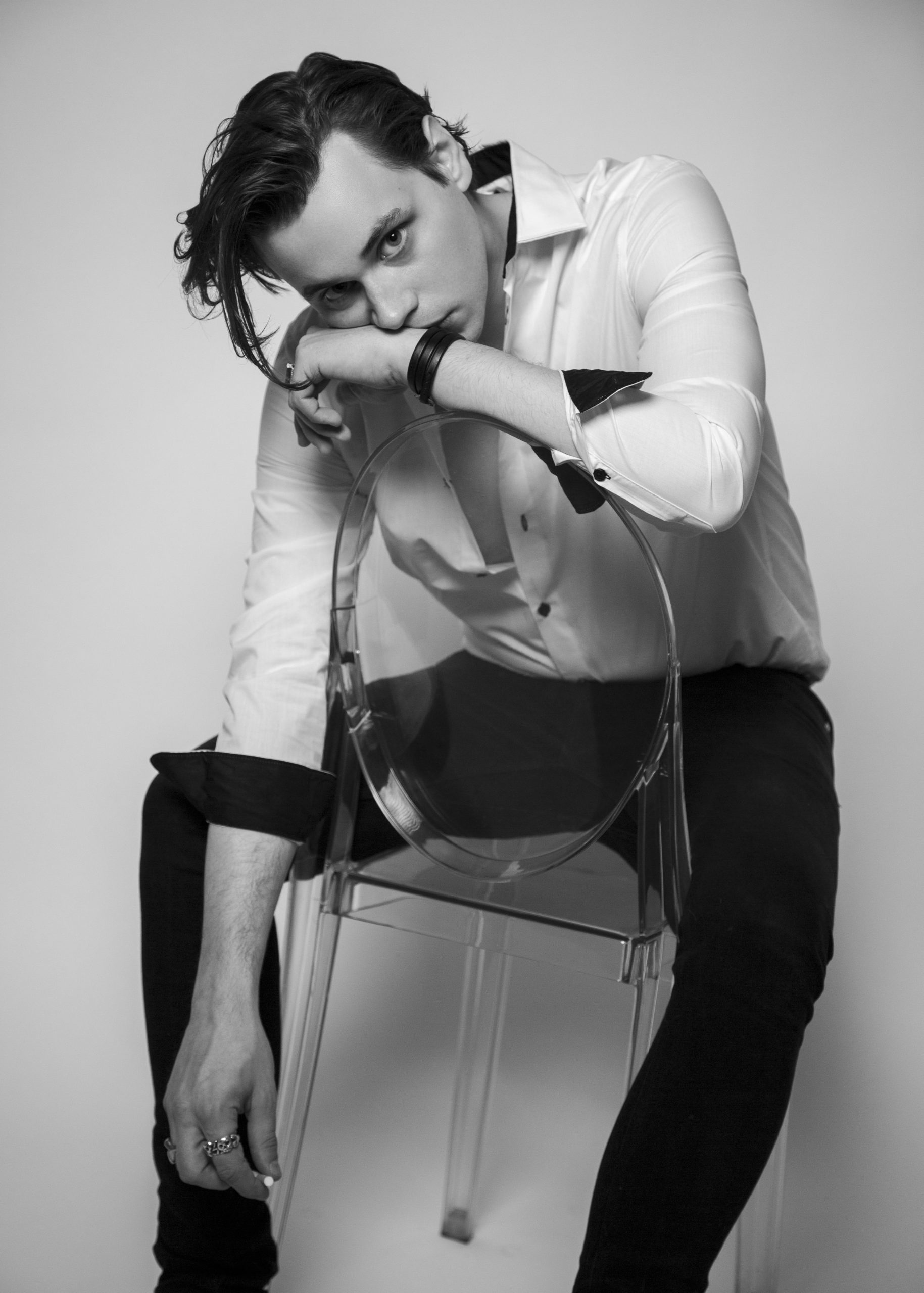Bellah Mae is the kind of artist who makes you want to scream-sing in your car with the windows down, hair whipping in the wind, fully embracing every chaotic emotion love can bring. Her music is bold, witty, and deeply relatable — whether you’re in the throes of heartbreak, reveling in post-breakup glow, or somewhere in between, her songs hit just right.
The rising UK pop sensation has quickly established herself as the voice of a generation tired of playing it cool. “Boyfriend of the Year” took over TikTok and became Mae’s debut single, a tiny snapshot of what she was capable of. Now, with the release of her new single “Bad Day To Be My Ex,” she’s fully embodying the punchy, empowering songwriter that clearly was always inside of her.
“I actually just had the phrase in my notes one day,” she tells me, laughing, when asked about the song. “I thought it was funny, but I wasn’t even thinking about it as a song concept.” That throwaway note turned into one of her most explosive singles, proving that sometimes the best ideas are the ones that come naturally.
It’s that off-the-cuff authenticity that makes Mae’s music resonate. She’s unafraid to name names — literally. The iconic lyric “a Gen Z Pamela Anderson” almost didn’t make the cut, but she trusted her gut. “We were like, is it the coolest thing or the lamest thing in the world to say Gen Z in a song? But I actually love Gen Z. We’re the coolest,” she says with a grin. That kind of unapologetic confidence defines both her music and the way she carries herself.
In conversation with 1883’s Kelsey Barnes, Bellah Mae opens up about the new single “Bad Day To Be My Ex,” flying to Nashville to write songs, the importance of staying vulnerable (and cutthroat) in writing rooms, and more.
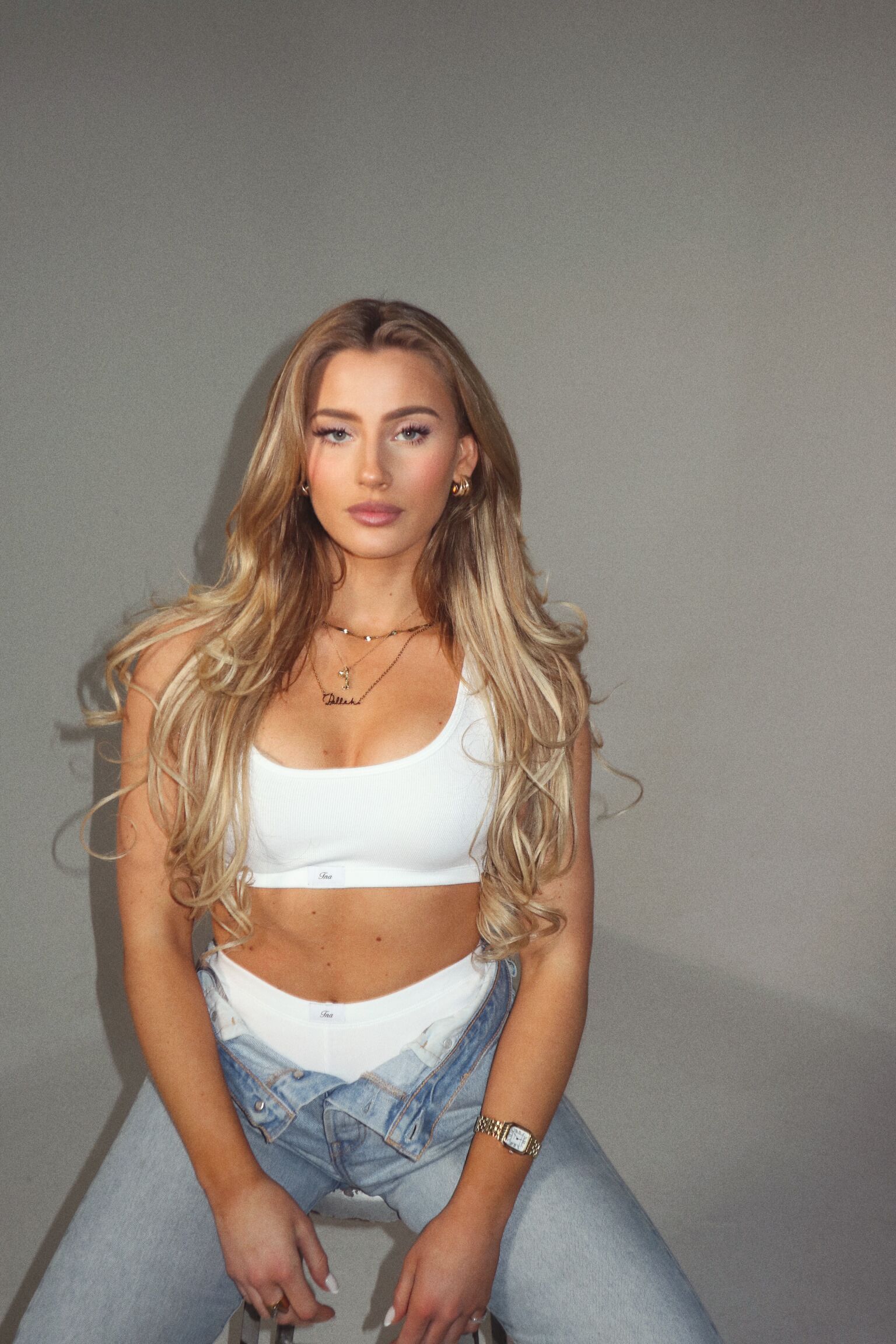
You and I grew up in a similar way, and by that I mean we both loved Hannah Montana and playing concerts for our families. Can you tell me a bit about your childhood and how music was the thread throughout it?
Yeah, music was always the thread running through really pivotal moments in my life. I honestly don’t remember a time without it, which I know sounds cliché for an artist, but I grew up in a very musical family. My granddad is one of the most talented musicians I know — he was a session musician for some amazing rock and roll artists, and my dad used to play with him. So from a young age, I was up on stage with them, performing little rock and roll songs. My dad taught me to play guitar when I was about 10, just casually — he didn’t necessarily expect me to pursue music, but I was just so into it.
I was also obsessed with Hannah Montana. I reference that a lot in interviews because I genuinely believe it was a pivotal influence in my life. I loved the show, I loved performing, which was interesting because I was actually quite shy as a kid, but something about being on stage just felt right.
I also trained classically as a soprano for about 11 years, while at the same time growing up in a rock and roll household and playing guitar. I think that’s how my sound developed — a mix of country, pop, and other influences. Since I’m from the UK, I wasn’t really surrounded by country music, so it naturally became this unique hybrid sound. I never consciously tried to make that happen — it’s just who I am. I think you have to understand my backstory to understand my music; otherwise, people might wonder, “Is she trying to be country?” But country music is definitely growing in the UK, which is exciting.
I also love so many different genres — I’m really not someone who sticks to just one. I don’t like being put in a box. My most-listened-to artists are usually a mix of rap and country because I love lyrics. That’s what draws me to certain genres, but I don’t want to be defined by one in particular — I just make music for what it is.
Yeah, you don’t want to constrict yourself or put yourself in a box that limits your creativity. As an artist, you want to be able to explore different avenues.
Exactly. And I think where an artist is from can sometimes make people expect them to fit into a certain mold. But I’ve always felt like I’m right in the middle — part pop, part country, part something else entirely.
Did you write your first song when you were nine?
Yeah, and I’d hate for those songs to see the light of day now!
When you were writing those early songs, did you already know you wanted to make a career out of music? At what point did you realize this was what you wanted to do?
I remember my first song — it was about a tree swing my dad gave me. I thought, “This could be it,” and I just never stopped writing. But I distinctly remember writing my first single, “Boyfriend of the Year.” I was at uni at the time, but I wasn’t really going — I was always in the studio instead. My dad always believed in my career, though I don’t think he fully knew what I was up to. I must have written hundreds of songs before I got to “Boyfriend of the Year.” The night I wrote it, I texted my dad and said, “I think I just wrote a career-starting song.” He was like, “What does that mean?” But when he listened, he loved it. I put it on TikTok, and that’s what started everything. That was about two and a half years ago.
How do you think you’ve grown as an artist and songwriter in those two years?
I think my lyrical style has remained consistent — I love being specific yet metaphorical. But in terms of subject matter and sound, I’ve definitely evolved. I’ve become a stronger writer and artist just by doing it more. My first EPs were very breakup-focused, a bit sad, and more introspective. But this new project feels more outward-facing, more confident. My previous songs made me want to stay in my bedroom, while these ones make me want to blast them in the car. I think you can hear the confidence in them, which reflects where I am in life now. Going through my early 20s, I’ve matured — not just in my music but in how I view things like breakups and personal growth. And with this project, I just don’t care as much — I’m making music that feels right to me.
But also care so much to release music that’s authentic.
Exactly, exactly. It’s an interesting thing to work through. Like, I don’t care about fitting into a box, but I care so much about this music and people hearing it. That balance is something to navigate.
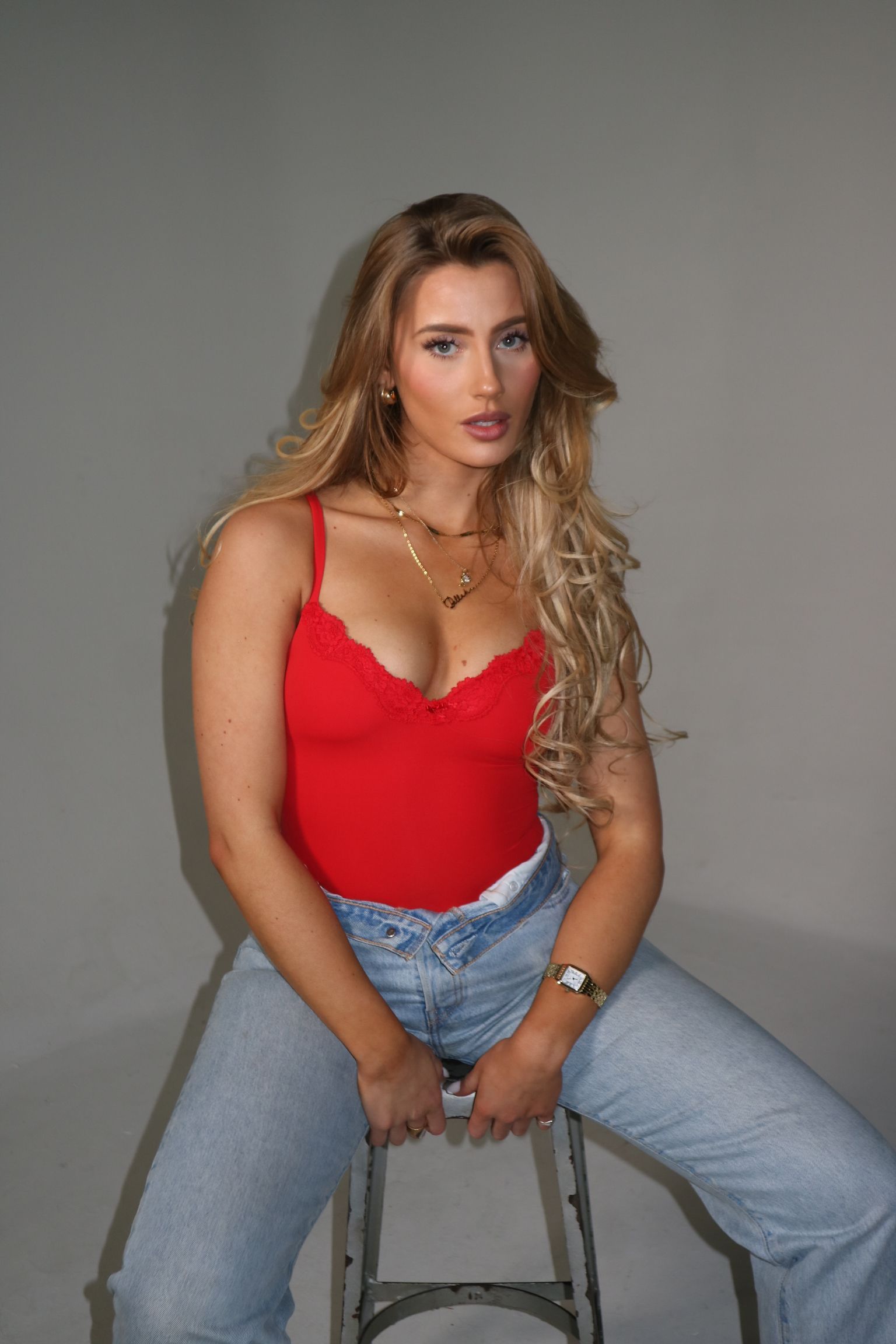
You touched on your dad and grandfather — how did spending time with them and their music shape you as an artist? Do you think that experience contributed to your ability to move between genres so freely?
Absolutely. No matter who you are as an artist, it’s always interesting to take influence from different genres and generations of music. There’s so much to learn from people who have been doing this before you. One of my biggest inspirations is Dolly Parton — my dad and granddad introduced me to her music. She’s still one of my biggest influences because of how she navigated being a female artist in the industry 50 years ago. She was so endearing and lovable, yet confident and completely herself. That’s something I’ve taken to heart — I don’t have to be overly tough to be strong. I’m naturally quite girly and giggly, but I’ll also write a savage song if you break my heart.
I also love storytelling — that’s something I’ve learned from the country music I grew up hearing from my dad and granddad. Country music tells a story so well, and I’d love to be known for that in my own way.
Yeah, because pop music isn’t always centered on storytelling, so bringing that country-style narrative into a pop framework is a cool balance. Was that always a goal for you?
Absolutely. From my very first interviews and studio sessions, I’ve always said that pop serves its purpose well—it’s uplifting and makes people feel something in a different way. But my goal has always been to combine that with storytelling and emotion. I’ve always felt things deeply, and I love talking about emotions and relationships. If I can make you feel something with my music, then I’ve done my job.
What do you typically draw inspiration from? Is love the biggest one for you?
Definitely. I’d say love makes up about three-quarters of my writing.
That’s true for so many storytellers — it’s the big theme.
Exactly. But what’s interesting is that writing about love often extends beyond just romantic relationships. At the core, people just love people — we’re nothing without connection. For my next project, I want to write more about my own perspective, rather than just focusing on the other person in the relationship. That’s something new I’m exploring.
Nashville has been a big part of your artistic journey. Danny Nozell, Dolly Parton’s manager, heard your music and has been a mentor. You also took part in Song Suffragettes in Nashville, which is an amazing showcase, and I know you’re writing in Nashville fairly often — like right now! Can you talk about that experience and how Nashville has shaped your music and songwriting?
I got involved with their team when I was about 19 or 20. They backed Song Suffragettes, which is an all-female writers’ round. I came out here to perform at their anniversary show, took meetings, and then we went straight into lockdown. During that time, I was just writing and figuring things out. Danny was a great mentor—he introduced me to people I now work with. He doesn’t manage me, but his whole team is incredible. Watching how they operate around Dolly was amazing — such a full-circle moment.
Nashville has really shaped me. UK artists usually think of New York and LA for breaking into the US, but Nashville is like a mini LA in terms of writing and production quality. The industry here is so focused on the love of music rather than chasing a hit. I work with a small, tight-knit team here, and we just focus on making the best songs possible.
That’s great. It sounds like Nashville’s songwriting culture is so much more collaborative.
Exactly. I love working with people who aren’t in it for the wrong reasons. Songwriting is a vulnerable process, so having a team you trust makes all the difference.
“Bad Day To Be My Ex” is an incredible, empowering anthem. Can you tell me a bit about what inspired that song and what it was like to write it? “A Gen Z Pamela Anderson” is such an iconic line.
The song actually came from a note in my phone—my notes page is a scary place. It’s like 3,000 notes that have gone into just making this; it’s crazy. One day, I was flicking through and saw something like, “But it’s a bad day to be my ex.” It just came to me. I think I might have said it out loud and thought, “That’s funny,” so I wrote it down. I wasn’t thinking of it as a concept at the time.
Then, on the last day before I left Nashville last time, one of my co-writers, Grace, saw it and was like, “That’s really cool. I think we should flesh that out.” And I said, “Okay, let’s do it.” It kind of wrote itself. At one point, we’d written the line, “Looking so good, no way you can handle it.” I thought, I would love to say something really unique. I wanted a strong visual. I’m obsessed with 90s movie culture, and I love Pamela Anderson anyway. I suggested we put a name in it. At first, I thought of something like “a 2000s Pamela Anderson,” but we were missing a few syllables. Then, I said, “Would it be really cringe to say ‘Gen Z Pamela Anderson’?” We debated whether it was the coolest or lamest thing to put “Gen Z” in a song. But honestly, I love Gen Z. We’re the coolest.
And I love that you put it as your Instagram bio, too! That perfectly summarizes this era for you. If we’re going to be iconic, let’s go all in. I think it’s interesting — Pamela has really taken the reins of her career despite all the bullshit she’s gone through in the industry. Same with Dolly Parton. These women are business moguls who have had to prove themselves. I feel like you’re embracing that energy.
I just love a strong woman.
You did an interview where you said, “I’m not here for the guys; I’m here for the girls. I only want to win for the girls.”
Yeah! I’m so proud to have a female-first following. My audience is predominantly women, which I think is the best thing ever.
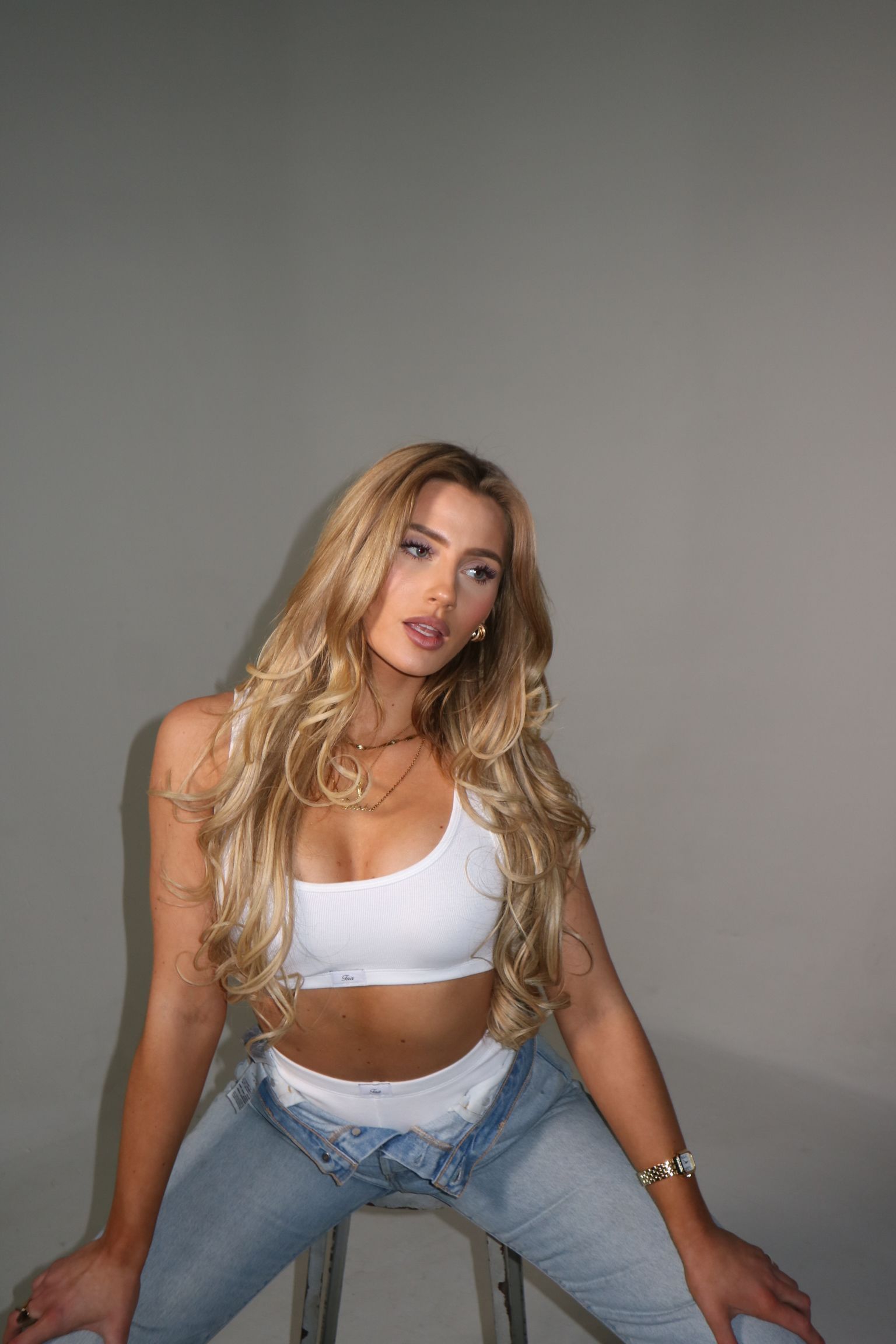
Your music is so vulnerable. Has that always been something you’ve embraced, or does it ever feel daunting?
No, I actually have this wild ability to detach as soon as a song is written, especially once it’s released. Up until recently, I’ve written a lot about guys, and I show no mercy — the details, everything. If it’s about you, and people who know us will know, then so be it. But by the time the song is out, I’m completely detached.
Like, “Oh, I forgot I put that in.”
Exactly. I’m an open book in the studio. I don’t mind at all. I’m probably too open, honestly. I think it’s because we all go through similar things. One of my top comments on social media is, “Did we date the same guy?” I get that at least once a day. Especially when you’re dating in your late 20s or early 30s, there’s definitely a mold of guys. They’re all friends, so they’re all the same. And honestly, yeah, maybe we did date the same guy.
If your upcoming work lived in a cinematic universe, what other albums or films would exist alongside them?
Hmm… What’s that Heath Ledger movie?
10 Things I Hate About You?
Yes! 10 Things I Hate About You. Also, maybe How to Lose a Guy in 10 Days. That’s one of my favorite movies because it’s so fun and playful, but also mature. It’s not set in high school; they’re in their 20s, so it’s not serious until it is. That vibe fits perfectly.
After people listen to these songs, what do you hope they feel or take away from them?
I just hope they feel something. If they feel that little feeling in your stomach, whether it’s, “Okay, fine, I’ll call my ex,” or “Oh my god, I hate my ex.” I hope it resonates somehow, and it can help whoever is listening.
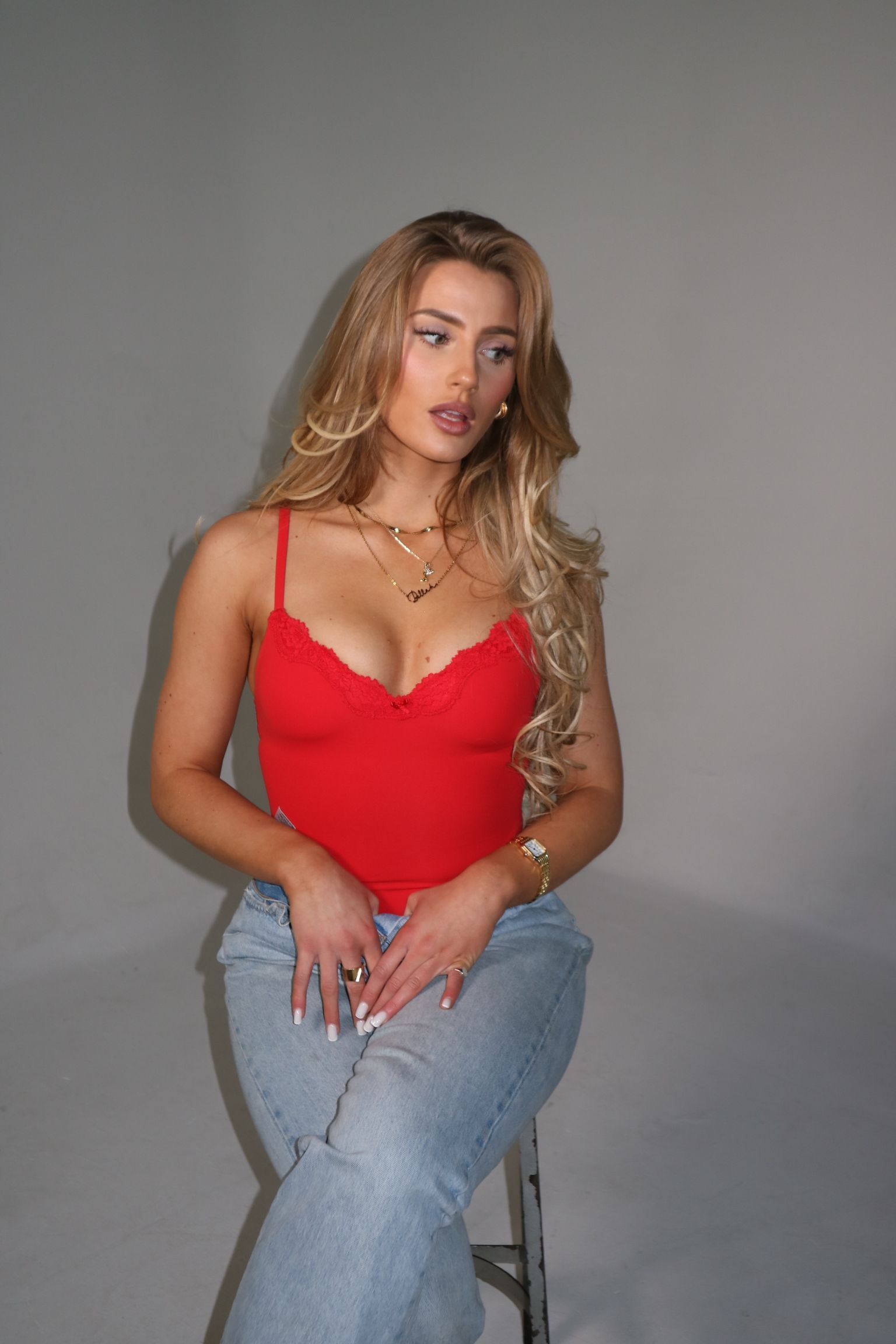
“Bad Day To Be My Ex” is out now.
Interview Kelsey Barnes

